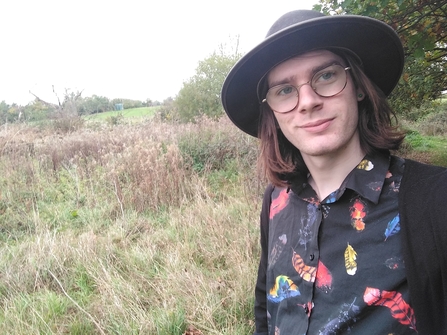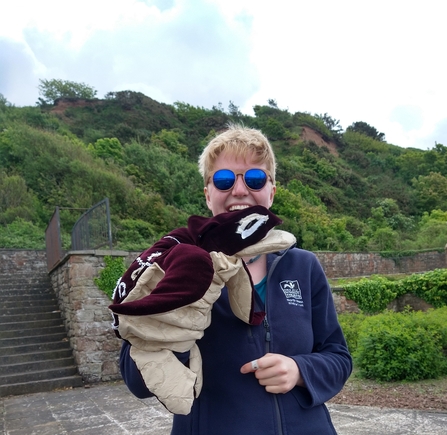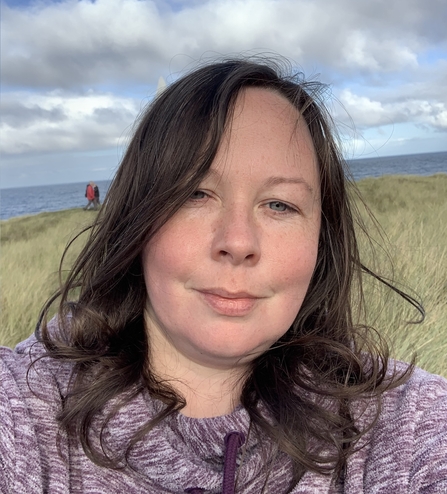LGBTQ+ Staff Spotlights

Growing up in a tiny village where all the boys played football meant that I identified myself as “one of the girls” - joining in with their games, doing cartwheels, playing hopscotch, and making daisy chains. From an angelic young boy wearing flower crowns to my current role at Worcestershire Wildlife Trust, a lot has changed in my life.
My name is Finley, I use they/he pronouns, and I am genderfluid and demisexual.
Since a young age, I have been fascinated by nature, letting this love influence my educational and career paths. I studied Ecology at Aberystwyth University and went on to do a Masters in Environmental Management. I now work as a Natural Networks Officer at Worcestershire Wildlife Trust. My time at university was very eye-opening to me – I learnt about a plethora of sexual and gender orientations and Uni provided me with a safety net to experiment with self-expression, alongside supportive and like-minded people. I first discovered I was demisexual, a subcategory of Asexuality. Later, I reflected on my life experiences with regards to gender expression, eventually discovering genderfluidity- which felt so natural and suited to my experiences and feelings. Being genderfluid allows me to express myself however I feel comfortable day to day- as I have been doing for so much of my life without even realising.
Why is LGBTQ+ inclusion in the workplace important to you?
There are still LGBTQ+ people who don’t feel comfortable truly expressing themselves. This lack of true self-expression, due to fear of comments or backlash from colleagues, is not a culture wanted in any workplace, especially when the comments are usually of an uneducated misunderstanding on the topic. LGBTQ+ inclusion is important to me because I want everyone to have an equitable educated understanding of LGBTQ+ identities, thus allowing for true self-expression from everyone.
How can cis/straight people be better allies?
Education is key to becoming a good ally. However, this shouldn’t simply be placed on the shoulders of cis gendered people. The queer community have a duty to be open to inquisitive individuals and help answer questions about LGBTQ+ topics when they can. Never be scared to ask a question on LGBTQ+ issues and stay curious.
Lou Mather

I am a marine engagement officer with Cumbria Wildlife Trust, meaning I get to spend a lot of time running around on the beach, poking about in rockpools, and generally exploring the weird and wonderful wildlife of the Irish Sea with community groups across West Cumbria. Outside of work, I am a keen rock climber, folk dancer, cold-water swimmer, and very amateur and experimental wildlife gardener, with mixed success.
Why is LGBTQ+ inclusion in the workplace importantto you?
As a non-binary person, nature has always been a space where I feel I can be myself without the restrictions or expectations of any particular gender roles, and part of the reason I went into conservation was to help others experience the joy and freedom of wild spaces, and rebuild their connection to nature through whatever lens feels important to them. Creating work environments where people are able to bring their full uninhibited selves to the fight for our natural world feels so important, both for making individuals feel safe and supported so they can focus all their energy on the important work they’re doing for wildlife, and also building queer community in rural locations where traditional LGBTQIA+ spaces are often difficult to find.
What challenges do LGBTQ+ communities face when accessing and engaging with nature?
Wildlife conservation can be a very traditional sector, and many people, both staff members and volunteers, struggle to wrap their heads around the concept of trans and non-binary gender identities, meaning they are often neglected or ignored and genderqueer people need to spend a lot of time and energy raising awareness and explaining these concepts, which not everyone is comfortable doing. This can lead to issues such as people being misgendered, which can be a very uncomfortable and even traumatic experience, and people feeling unsafe or unwelcome at nature events, which may stop them from engaging with the activities entirely, or not participating as much as they could otherwise.
How can cis/straight people be better allies?
Creating spaces where gender and sexuality are not felt as limiting factors, through the language that we use (such as avoiding using gendered terms when addressing a group), the facilities we provide (such as gender-neutral bathrooms), and the stereotypes we promote (for example asking about partners rather than “boyfriend” or “girlfriend”), can really help LGBTQIA+ to feel comfortable and accepted. And doing your own learning from the vast pool of resources available online, and sharing that knowledge with the people around you, can help to take the emotional load of teaching people how to be better allies away from LGBTQIA+ people.
Siobhan Pollard

My name’s Siobhan. I’m a Finance Assistant for Staffordshire Wildlife Trust, although I have been involved in a few different roles around the Trust in the nearly ten years I have been employed by them! I have a passion for wildlife, and most of my holidays and trips revolve around spotting wildlife I have never seen before. I live with my fiancée, and we are due to marry in July, in our favourite county of Northumberland. We’re both very excited!
Why is LGBTQ+ inclusion in the workplace important to you?
Having my partner recognised as my family, and being able to have her as my legal next of kin is a big part of why inclusion is important to me in general, but also in recognising this from a work perspective. It’s the recognition that relationships take on all sorts of shapes, and are no less legitimate than heteronormative relationships and families. Having equal opportunities and rights is very important to all of us.
What challenges do LGBTQ+ communities face when accessing and engaging with nature?
The biggest challenge is representation when it comes to the challenges are communities - and others face. When it comes to visual representation on screen, there are very few openly out ecologists. Although, it is a huge stride forward that organisations are taking with inclusivity, more could definitely be done!
How can cis/straight people be better allies?
On the whole the workplace is becoming a much more supportive and inclusive environment in most organisations. Listening is the key, and being willing to evolve their thinking. A lot of misconception of LGBTQ+ living is based on out-of-date information, or misunderstanding.
Can you share an LGBTQ+ focused TV/film/book recommendation?
I have lots! “It’s a Sin” is a great dramatization of a particularly important time in our history, and definitively worth a watch. “Pride” the film is underrated, and based on a true story on the unlikely alliance of miners and the gay community.
Roger Mortlock
I am just coming to the end of my time at the Wildlife Trusts after an amazing 10 years as CEO of Gloucestershire Wildlife Trust. It’s the job I’ve enjoyed the most, been proudest of, and has been the most fun. I’m really going to miss life in the movement. Outside work, I am a fanatical cyclist and live with my partner, Arthur, just outside Stroud.
Why is LGBTQ+ inclusion in the workplace important to you?
I started my working life at the height of the HIV/AIDS crisis and when Section 28 of the Local Government Act prevented teachers from discussing gay lifestyles in schools. Even working in London in the media, the workplace could feel like a hostile place for queer people. So much has changed, most of it for the better – but there’s still work to do. Inclusion is important to me not just because it’s the right thing to do morally, but also because it helps recruit and retain the very best people.
How can cis/straight people be better allies?
It’s a cliché but listening is a great start. And don’t presume anything. But the flip side to that is that as a community to we need to talk about our experience more and normalise it.
Can you share an LGBTQ+ focused TV/film/book recommendation?
There were no young adult queer books when I was growing up, so I am hoovering them up now. It’s great to see young queer lives portrayed so joyously – and I especially love Adam Silvera’s books and Alice Osman’s amazing “Heartstopper “comic series (now a Netflix series).
Ellie Murray
My name is Ellie and I am the Volunteer Coordinator at Gloucestershire Wildlife Trust. I love being outside in nature, and also enjoy cooking, gaming and singing!
Why is LGBTQ+ inclusion in the workplace important to you?
LGBTQIA+ inclusion in the workplace is hugely important to me. Individuals spend a massive part of their week at their workplace, and it’s essential for them to feel themselves at work. I only came out as Bisexual as a result of a previous workplace having such a strong LGBTQIA+ network. Everyone, from the CEO and board of trustees, all the way down to entry level workers used pronouns, educated themselves on good EDI practices and were aware of how to be a supportive ally - this environment gave me the strength and confidence to be a true version of myself! Working in a rural county, I am eager to be proactive so that others know it’s ok to be themselves, and know there is a community out there to support them – they are not alone!
What challenges do LGBTQ+ communities face when accessing and engaging with nature?
I think in my area of work (volunteering) I think engaging in volunteering as a member of the LGBTQ+ community could be a barrier, as our trust at least have a lot of older volunteers, which often comes with that stereotype that they might not be so comfortable with LGBTQIA+ related discussion. For example, if I was a member of the Trans community, I think I would be incredibly nervous joining some of our work parties. So this is something I am looking into to ensure we are making our volunteering space as welcoming and inclusive as possible.
How can cis/straight people be better allies?
- Be proactive to learn about LGBTQIA+ topics- by understanding the difficulties your LGBTQIA+ colleagues might be facing you can be a better ally.
- Use your pronouns in your e-signature, in presentations, and when meeting new people; It might not be a big deal to you, but it could mean so much to others.
- Be wary of times where LGBTQIA+ colleagues might need extra check-ins - attacks in the media on the community where they might be feeling vulnerable or hurt, following a time someone has misgendered them, or if they generally seem down; Depression and suicide rates are a lot higher in the LGBTQIA+ community.
Can you share an LGBTQ+ focused TV/film/book recommendation?
I have just finished reading ‘Untamed’ by Glennon Doyle. It’s one of those books everyone should read, and talks about being free, and a true version of yourself. Although not solely focused on LGBTQIA+ matters, she had been repressing feelings towards women for decades until she clocked eyes with the love of her life at a book launch- she shares stories of her and her now wife which are really heart-warming. It’s easy to read with short chapters (which was great for me as I am not a strong reader) but she also does a podcast with her wife and sister called ‘We Can Do Hard Things’ which I would also recommend! Another podcast I would recommend to everyone is Out with Suzi Ruffell. In each episode she interviews a new person from the community, and also shares stories sent in by listeners. As a comedian herself, she often interviews other comedians, my favourite episode so far probably being when she interviewed Alan Carr. It is the most wonderful podcast!

